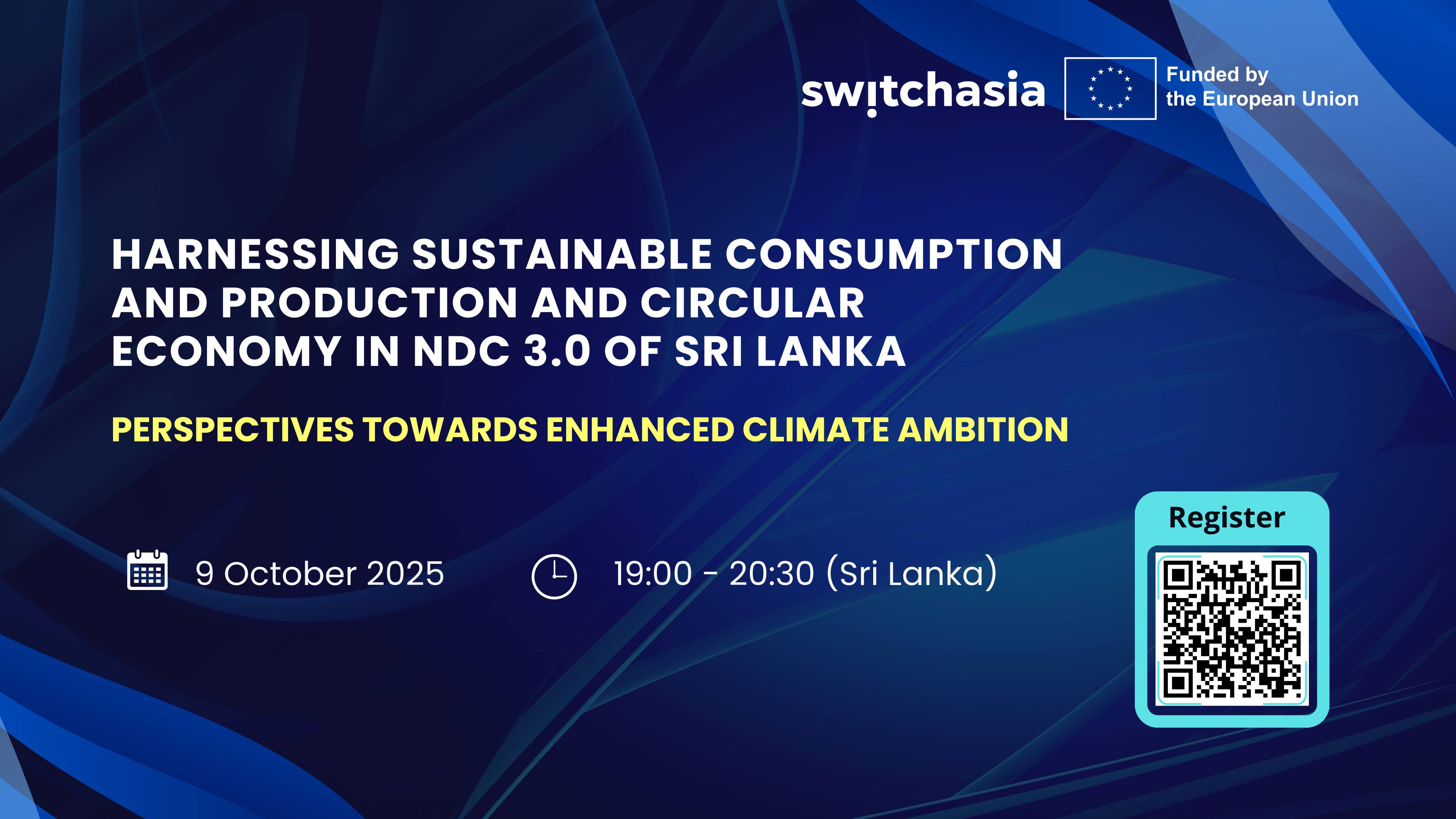
WHEN: 9 October 2025 I TIME: 19:00-20:30 (Sri Lanka Time) I Register HERE
Background:
Unsustainable consumption and production patterns lie at the core of the triple planetary crises encompassing climate change, biodiversity loss, and pollution. The scientific community has firmly established the link between climate change and material consumption. According to the Global Resource Outlook 2019 report of the International Resource Panel (IRP), our global population has doubled, material extraction has tripled, and gross domestic product has quadrupled during the past five decades. In the last twenty years, there has been a noticeable acceleration in the extraction and utilization of natural resources, which have been responsible for about half of the effects we observe in climate change. However, it's essential to recognize that the linkages between materials and climate change remain largely uncharted territory within the realm of climate change strategies and actions.
The 6th Assessment report from the Intergovernmental Panel on Climate Change (IPCC) has once again sounded the alarm for global policymakers, emphasizing the urgent need to prevent the Earth's temperature from reaching dangerous levels. The collective global inaction in addressing the challenges posed by climate change has compelled humanity to pursue more rapid and ambitious climate actions. The recently published Global Stocktake (GST) report, as part of the Paris Agreement under the United Nations Framework Convention on Climate Change (UNFCCC), has concluded that, based on current Nationally Determined Contributions (NDCs), there is a significant emissions gap of 20.3–23.9 Gt CO2 equivalent by 2030 to stay on track with limiting global warming to 1.5 °C. The trajectory of this shortfall in ambition is pointing towards a potential temperature rise of 2.8°C by the end of the century. Even if the current NDC targets are fully implemented, it can only limit the temperature increase to 2.4-2.6°C by the century's end, as highlighted in the 2022 UNEP Emission Gap Report.
The UNFCCC GST report also underscores that achieving net-zero emissions will vary from country to country, necessitating a comprehensive, nationwide effort in all countries to to chart pathways towards net-zero CO2 or greenhouse gas (GHG) emissions. While these steps are critical for GHG mitigation, it's essential to ensure a broader "social transformation" to guarantee that investments in these initial measures yield the desired results. Given the pressing need for increased ambition in climate action, it becomes crucial to leverage all available avenues without compromising sustainable development. Sustainable Consumption and Production (SCP) and Circular Economy emerge as compelling options for harnessing climate change co-benefits.
The SWITCH-Asia PSC has recognized that there are instances in various countries where Sustainable Consumption and Production (SCP) and Circular Economy (CE) elements have been incorporated into their existing Nationally Determined Contributions (NDC) targets. This positive development indicates room for further enhancement and expansion. Currently, the program is executing a brief Technical Advisory (TA) initiative across six South Asian nations. The objective is to gain insights into the present status and the potential for integrating SCP/CE principles into their NDC commitments.
About Webinar
The proposed webinar is designed to serve as a platform for sharing Sri Lankan insights and experiences at the intersection of climate change and Sustainable Consumption and Production (SCP) / Circular Economy (CE). Its aim is to facilitate knowledge exchange, share lessons learned, and explore practical pathways for integrating SCP/CE into climate action.
The webinar is organized to achieve three key objectives:
- Identify and deliberate on the current global and local understanding of the linkages between climate change and SCP.
- Explore opportunities to integrate SCP/CE into climate actions to harness synergies and co-benefits at the local level.
- Address challenges and solutions in deploying SCP/CE strategies to enhance climate ambitions in Sri Lanka.
Hosted by the SWITCH-Asia Policy Support Component (PSC) in collaboration with the Board of Investment (BOI) of Sri Lanka, the event will bring together experts, policymakers, and industry stakeholders to examine how SCP and CE can be embedded into Sri Lanka’s NDC 3.0 commitments.
The session will feature key presentations on recent scientific findings, national climate ambitions, and policy linkages between SCP, CE, and the NDC 3.0 process. Insights from the Global Resources Outlook and the Global Stocktake (GST) of the Paris Agreement will provide both global and national perspectives.
A discussion forum will follow, offering diverse viewpoints on strategies, challenges, and opportunities—both locally and across Asia and the Pacific—for integrating SCP and CE into climate policies and national agendas.
Tentative Agenda
|
Time |
Session |
|
7.00 – 7.10 pm |
Welcome and Introduction – Dr. Sanjay Vashist, Key Expert, EU SWITCH-Asia Policy Support Component |
|
7.10 – 7.20 pm |
Highlights of Sri Lanka's enhanced climate ambition and NDC 3.0 process Dr. Sunimal Jayathunga, Additional Secretary, Ministry of Environment |
|
7.20 – 7.30 pm |
Importance of addressing Sustainable Consumption and Production / Circular Economy at the policy level in Sri Lankan Industries. By Mr Amila Wanasinghe, Assistant Director- Environment Management, Environmental Division -BOI Sri Lanka |
|
7.30 – 8.10 pm |
Harnessing Sustainable Consumption and Production / Circular Economy in Sri Lanka’s Industry Sector. Eng. Samantha Kumarasena – CEO of National Cleaner Production Centre. Dr Arosha Hemali – Lecturer at the University of Sri Jayawardenapura, National Expert on EU SWITCH-Asia Policy Support Component. |
|
8.10 – 8.20 pm |
Q&A session and Wrap Up by Mr. Ranga Pallawala, Key Expert, EU SWITCH-Asia Policy Support Component. |


